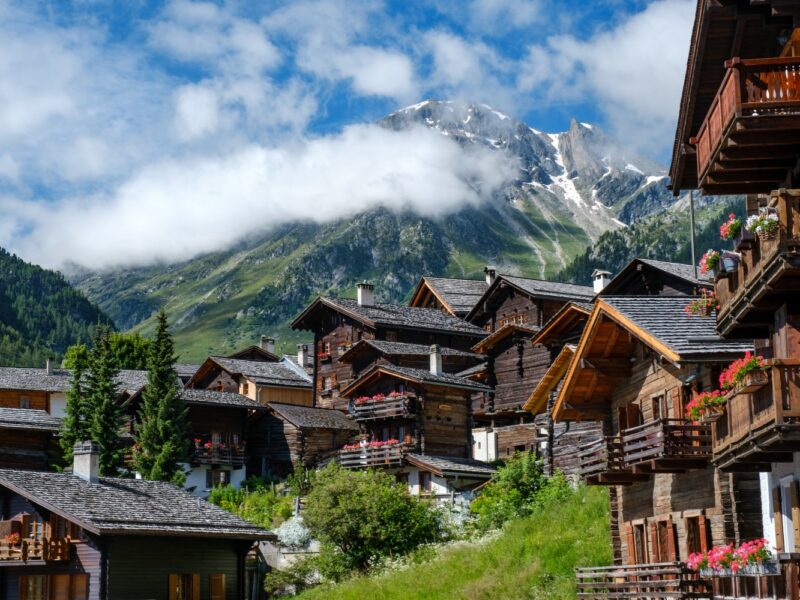No matter how many times you’ve packed an RV, it still takes some effort to plan and fill the space relatively well. Even if your RV seems like it has plenty of storage areas, they tend to be smaller than average.
And once you start filling the RV with all your belongings, it quickly becomes cramped and cluttered. If you’re planning a road trip in an RV, use this guide to help you pack efficiently and avoid common mistakes.
How do you know what to pack? And how do you fit everything in without creating a cluttered mess? Fear not! We’re here to help. In this blog post, we will walk you through the basics of packing your RV for travel. Additionally, we will also provide some useful tips on how to optimize your RV’s power usage and recommend the best RV battery monitors to ensure you never run out of power during your trip.
By following our tips, you’ll be able to create a well-organized and functional space that will make your next road trip a breeze!
Why the Proper Loading and Packing Matter?
RV travel is a great way to see the country and spend time with family and friends. However, it is important to pack your RV properly to ensure a safe and enjoyable trip.
Here are a few tips on how to pack an RV for travel:
- Pack heavier items in the bottom of the RV. This will help keep the RV balanced and stable on the road;
- Be sure to secure all loose items inside the RV so they don’t shift or slide around while you are driving. This includes putting away all dishes, glasses, and food items;
- Make sure your propane tanks are turned off and securely fastened before driving;
- Pack essential items like bedding, towels, and clothes in an easily accessible location;
The appliances, slide rooms, engine, generator, and water tanks are usually the heaviest items in a travel unit so weighing these items will let you know which axles are carrying the most weight. This way you can pack lighter where the weight is concentrated and heavier where it isn’t. Additionally, packing light items high up and heavy items lower down will also be helpful.
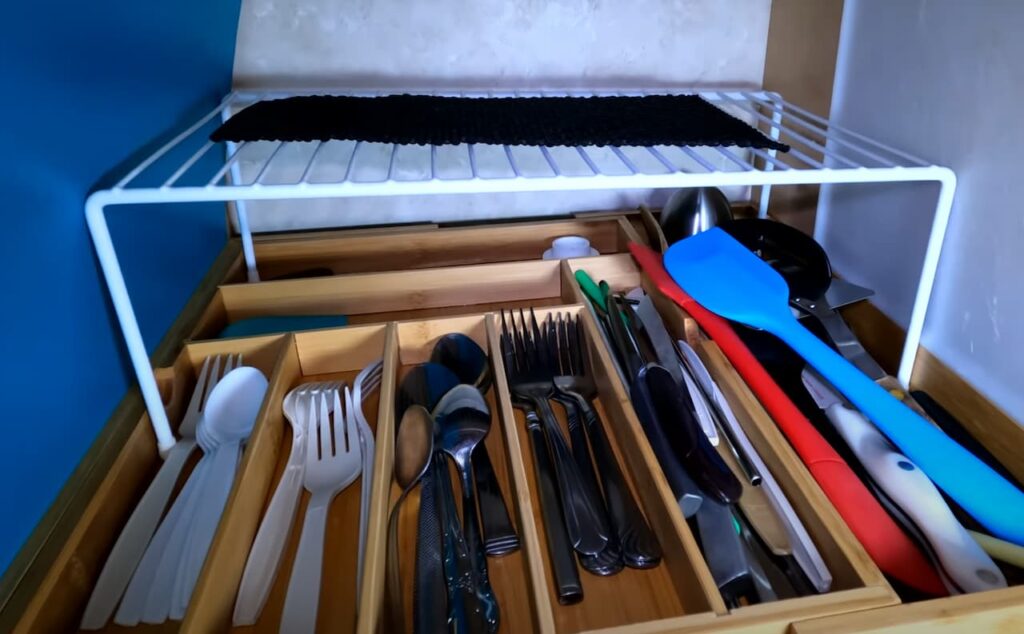
How to Pack Your RV For a Camping Trip?
1) Documents and Important Information
- Gather all of your documents such as your registration, proof of insurance, and a map of the area. It is also important to have an emergency plan in case you need to evacuate quickly;
- Make sure you know where all of your important documents are stored in the RV;
- Keep a list of phone numbers for emergency services, tow companies, and roadside assistance;
2) Kitchen Essentials
Refrigerator
One of the most important appliances in your RV is the refrigerator. You’ll want to make sure that you pack it with all of the food and drinks that you’ll need for your trip.
Here are a few tips for packing your refrigerator:
- Pack perishable items like dairy, meat, and produce in coolers with ice packs;
- Store non-perishable items like canned goods and dry goods in airtight containers;
- Use space wisely by storing smaller items in the door compartments;
Food
One of the most important things to consider when packing your RV for travel is food. You will need to make sure that you have enough food to last you for the duration of your trip. If you are traveling with a family, you will need to make sure that there is enough food for everyone. There are a few different ways that you can store food in your RV, such as in coolers or pantries.
Be sure to pack all the food and beverages you’ll need for your trip, including non-perishable items, canned goods, spices, condiments, coffee, tea, and more. It’s also a good idea to bring along some snacks and easy-to-prepare meals in case you don’t feel like cooking one night or get stuck on the road longer than anticipated.
Outdoor Cooking
One of the great things about RV travel is being able to cook your meals outdoors. However, this also means that you need to be more careful about food safety.
Here are a few tips for packing your RV kitchen for safe and delicious outdoor cooking:
- Make sure to pack your grill and any other cooking equipment you’ll need;
- If you plan on doing any fishing, pack a small cooler for your catch;
- And don’t forget the marshmallows! Roasting them over the campfire is one of the best parts of RVing;
- If you have any special dietary needs, be sure to pack enough of the right food and snacks to last your entire trip;
- If you’re traveling with small children, it’s always a good idea to have some easy-to-prepare meals on hand, just in case;
Cookware and Utensils
When packing your RV for travel, be sure to pack all the essential cookware and utensils you’ll need to prepare meals on the road. These items include pots and pans, plates and bowls, silverware, cooking utensils, and more. If you’re traveling with a large group, it’s also a good idea to pack extra cookware and utensils to accommodate everyone.
To save space in your RV, consider investing in collapsible cookware and/or nesting dishes. These items can be easily stored when not in use and will free up valuable space in your kitchen cabinets or drawers. Plastic dinnerware is also a good option for RV travel as it’s lightweight and unbreakable.
Instant Pot
If you love to cook while traveling, then you’ll definitely want to bring along an instant pot. This handy appliance can be used to cook a variety of meals, including soups, stews, rice dishes, and more. Plus, it’s great for making quick and easy meals when you’re short on time. Just add your ingredients to the pot, set the timer, and let the instant pot do its magic.
Fewer Seasonings
When packing your spices and seasonings, try to go light on the amount you bring. After all, you can always buy more if you need it. Plus, many stores now sell individual packets of spices, which are perfect for traveling. This way, you can just grab what you need without having to lug around a large container of each spice.
The Right Dish Soap
One thing that’s often overlooked when packing for an RV trip is dish soap. But it’s actually a very important item to pack, especially if you plan on doing any cooking while on the road. Be sure to pack a small bottle of dish soap so you can wash your dishes after every meal. Trust us, you’ll be glad you did!
Paper Towel Holder Stand
This is one of those things that you don’t realize how useful it is until you have it. A paper towel holder stand allows you to put your paper towels on the counter instead of in a drawer. You can also use it to hold other things like spices or Tupperware lids. It doesn’t take up much space and it’s very handy.
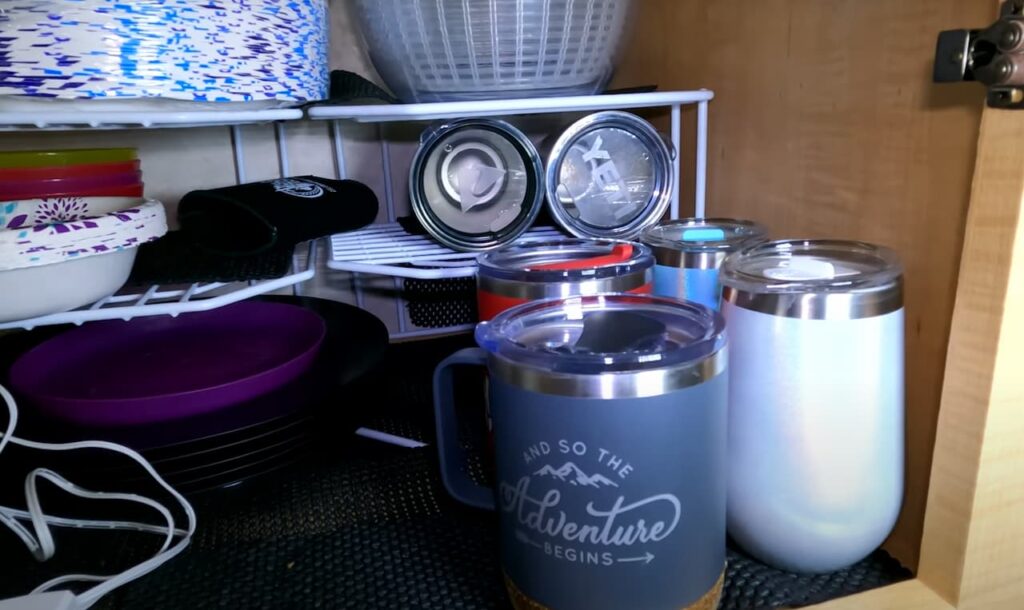
Water
Water is the most important thing you need to pack for your RV trip. You should pack enough water for drinking, cooking, and cleaning. It’s a good idea to pack extra in case of emergencies.
Cleaning Supplies
You’ll need to pack cleaning supplies for your RV trip. This includes things like soap, shampoo, towels, sponges, and trash bags. You may also want to pack a broom and dustpan.
Hygiene and Health Items
You’ll want to make sure you have all of your hygiene and health items packed and ready to go before you hit the road. This includes things like toilet paper, soap, shampoo, toothpaste, bug spray, etc. You should also pack any medications you might need, as well as a first-aid kit.
3) Electronics
Adapters and Chargers
If you’re like most people, you probably rely on your electronics to stay entertained and connected while on the road. Be sure to pack all the necessary adapters and chargers for your devices.
A power strip can also be handy for charging multiple devices at once. And don’t forget your camera! Traveling is a great time to document all your adventures with photos and videos.
Lighting
RVs can be notoriously dark, so it’s a good idea to pack some extra lighting. Portable lamps are great for reading or playing games in the evening. And if you’re planning on doing any cooking while on your trip, make sure to bring along a flashlight or two for those late-night trips to the grocery store.
Heavy Duty Extension Cords
If you’re planning on using any appliances while on your trip, be sure to pack some heavy-duty extension cords. Many RVs have limited outlets, so it’s important to be able to make the most of the ones you do have. And if you’re traveling with young children, consider packing a night light or two to help them feel more comfortable in unfamiliar surroundings.
Generator
If you’re traveling in an RV, chances are you’ll need a generator at some point. Whether it’s for powering your lights or charging your devices, a generator can be a lifesaver. Be sure to pack one that’s the right size for your needs, and don’t forget the gas!
4) Clothing and Linens
Hiking Clothes/Warm Layers
- A good pair of hiking boots or shoes;
- Warm layers like a fleece or sweater;
- A rain jacket;
- Hat and gloves;
For colder weather camping, you might also want to pack:
- Thermal underwear;
- Socks;
- Snow pants;
Packing for different climates will obviously require different items, so just be sure to check the weather before you leave! Regardless of the climate, always remember to pack extra clothes in case of emergencies. You can never have too many socks.
Swimsuits
If you’re planning on doing any swimming while on your trip (in a lake, river, or pool), pack at least one swimsuit for each person. You might also want to pack towels, sunscreen, beach toys, and floats/rafts.
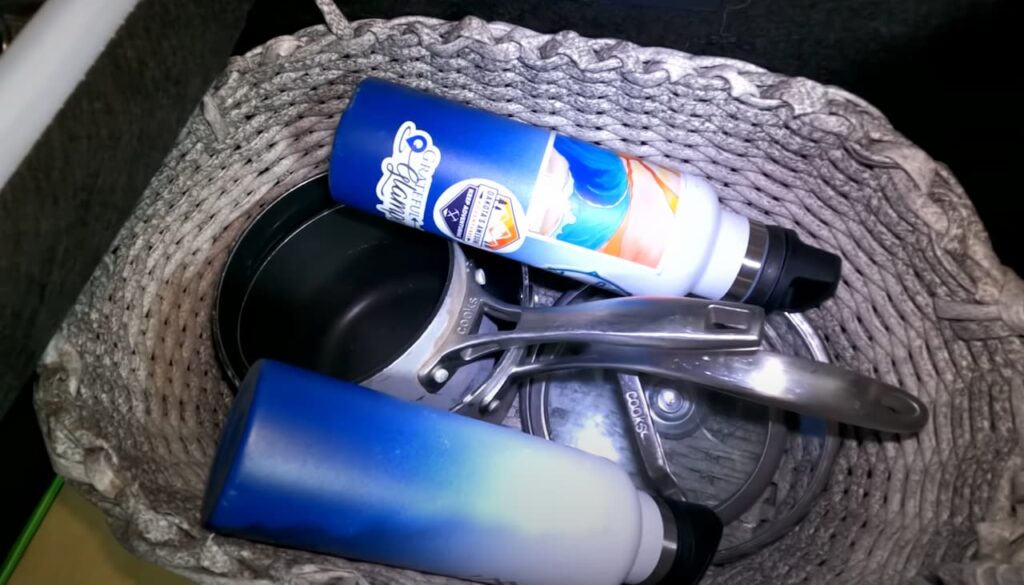
5) RV Camping Gear
Headlamps
Headlamps are essential for any camping trip, but they are especially important when camping in an RV. They allow you to see in the dark and make things easier when setting up camp at night. It’s also a good idea to bring along a few extra batteries just in case. You never know when you might need them!
Hammocks
Hammocks are great for camping in an RV because they take up very little space and can be set up just about anywhere. They are perfect for relaxing after a long day of hiking or exploring. Be sure to bring along some extra rope or string just in case you need it.
Fishing Gear
If you plan on doing any fishing while you are camping in your RV, then you will need to make sure you have all the necessary gear. This includes a fishing rod, reel, bait, and tackle. You may also want to bring along a fish finder if you have one.
RV Mat
An RV mat is a must-have if you plan on spending any time outside your RV. They are great for picnicking, sunbathing, or just relaxing in the shade. They also help keep your RV clean by keeping dirt and debris off of the floor.
6) Tools You Need to Have in the RV
Small Tool Kit
- An adjustable wrench for tightening gas and water connections;
- A hammer for pounding in tent stakes;
- Pliers for adjusting the brakes on your trailer or RV;
- A screwdriver set (flathead and Phillips);
- Electrical tape;
- Duct tape;
- Zip ties;
Car Repair Gear
You’ll want to make sure you have all the basic gear for car repair while on the road. This includes a come-along, jumper cables, an air compressor, and a few tools. It’s also a good idea to invest in some roadside assistance, just in case. If you plan on bringing a chainsaw with you on your trip, don’t forget to pack the best 2 stroke oil for chainsaw as well, to ensure optimal performance and longevity.
Duct Tape
Duct tape is one of those things that you always want to have on hand, but never seem to have when you need it. So make sure to pack a good amount of duct tape before setting off on your RV adventure. You can use it for everything from patching up holes in your RV to fixing a broken chair.
Gloves
One of the most important things to remember when packing for an RV trip is gloves. Gloves are essential for keeping your hands warm and protected from the elements, and they can also be used for cooking, cleaning, and other tasks around the campsite. Pack a pair of gloves for each member of your family, and make sure to pack extras in case you lose a pair or two along the way.
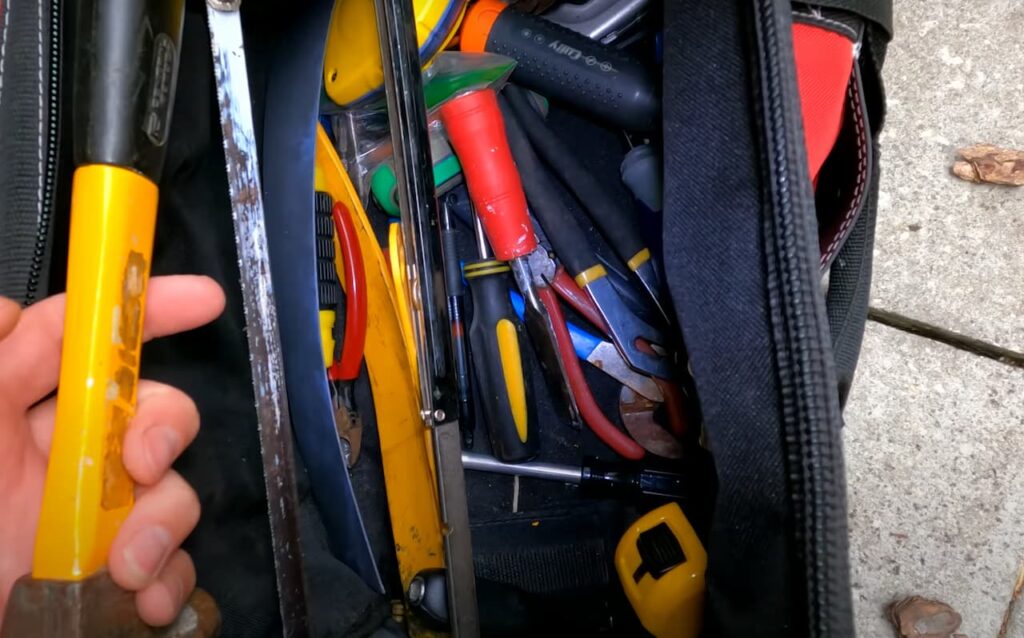
7) Entertainment
Board Games
A family favorite activity while camping is playing board games around the picnic table. Make sure to bring along some favorites, as well as some new ones to try out!
Some of our personal recommendations are:
- Ticket to Ride;
- Settlers of Catan;
- Pandemic;
- Carcassonne;
- The Resistance;
These will keep you busy for hours and are great fun for all ages. If you have kids, don’t forget to pack a few age-appropriate games for them as well!
Card Games
Playing cards is another classic camping pastime. There are so many great card games out there, and they are perfect for those rainy days stuck inside the RV.
A few of our favorites are:
- Exploding Kittens;
- Uno;
- Phase Ten;
- King of Tokyo;
- Cards Against Humanity;
Yard Games
If you’re camping with friends, yard games are a must! They are great for getting everyone together and having some friendly competition.
Some of our favorites are:
- Cornhole;
- KanJam;
- Ladder Ball;
- Yahtzee;
- Disc Golf;
8) Packing for Kids
Assuming you’re traveling with young children, it’s important to pack items that will keep them entertained during the trip. Games, books, and toys are all great options.
It’s also a good idea to pack snacks and drinks that they can easily access.
Lastly, if you’re traveling with infants or toddlers, be sure to pack plenty of diapers and wipes.
RV Packing Tips For Beginners
Make a List of Necessary Items Based on Daily Activities
The first step is to make a list of items you will need for your daily activities. This list should include items such as clothes, toiletries, food, and any other items you may need on a daily basis. Once you have this list, you can start packing your RV.
One important tip is to pack heavier items in the bottom of the RV and lighter items towards the top. This will help keep your RV balanced and prevent it from tipping over while driving.
Another tip is to use space-saving bags for clothing and other items that can be compressed. These bags take up less space and can help you fit more into your RV.
Finally, be sure to secure all loose items before driving. This will prevent them from moving around and becoming damaged while you are on the road.
Plan Your Meals and Bring Food With You
One of the benefits of traveling in an RV is that you can bring your own food with you and cook your own meals. This can save you a lot of money, especially if you are traveling with a family. But it also means that you need to plan your meals ahead of time and make sure you have all the ingredients you need.
Another option is to stop at grocery stores along the way and stock up on easy-to-prepare foods like sandwiches, salads, and snacks. If you are planning to do this, be sure to map out where the nearest grocery store is to your route so you can easily find it when you need it.
Dump Tanks Early and Often
One of the least pleasant parts of RV travel is having to deal with the sewage. Most RVs have two tanks – one for fresh water and one for wastewater. You’ll need to empty the latter at regular intervals, or else you’ll be dealing with some pretty nasty smells (and possibly some leaks).
To avoid this, make sure to empty your wastewater tank as often as possible. A good rule of thumb is to do it every time you fill up your fresh water tank. This way, you’ll never have to deal with more sewage than necessary.
In addition, you should always keep an eye on your wastewater level gauges. If they start getting close to full, empty the tank even if you haven’t filled up the fresh water tank yet. Better to be safe than sorry!
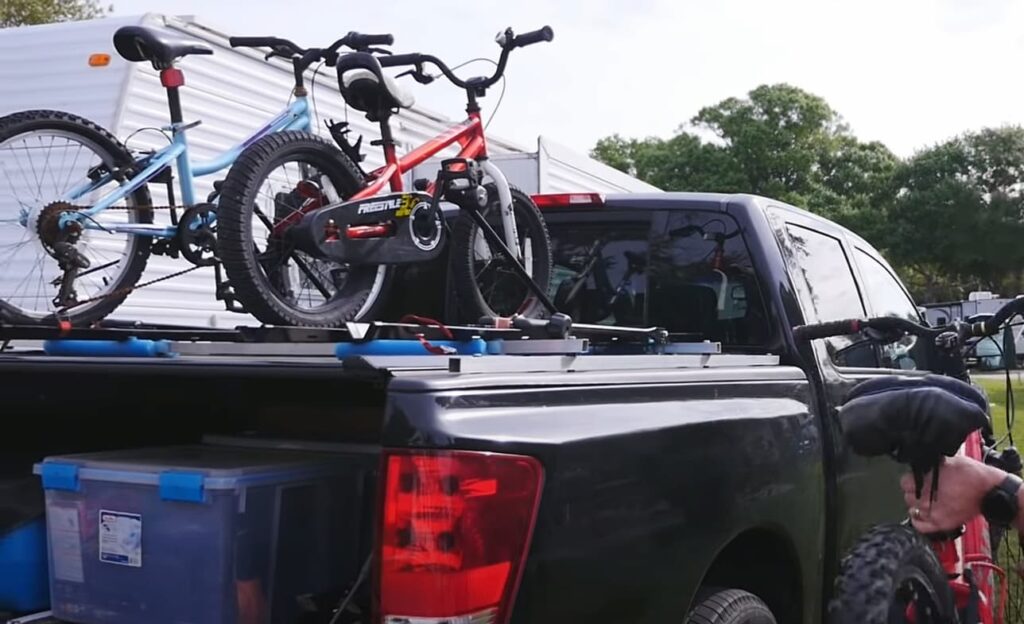
FAQ
How do you pack an RV efficiently?
There are a few key things to keep in mind when packing an RV for travel:
- First, pack heavier items towards the front of the RV and lighter items towards the back. This will help keep the RV balanced and stable on the road;
- Second, make sure to secure all loose items so they don’t shift or slide around while driving;
- Third, be mindful of what you pack in terms of food and supplies. Make sure to have enough food and water for everyone on board, as well as any necessary medications or first-aid supplies; Finally, try to pack as efficiently as possible so you can maximize space and avoid having anything crammed into a small area;
What can you not take in an RV?
There are a few things you cannot take with you in an RV, such as:
- Pets that are not allowed in the RV park or campground;
- Items that are illegal in the state or country where you are traveling;
- Weapons of any kind, including firearms, knives, and pepper spray;
- Flammable liquids, such as gasoline, propane, and kerosene;
- Explosives, such as fireworks;
How do you pack clothes in an RV?
There are a few different ways that you can pack your clothes in an RV:
- One way is to use vacuum-sealed bags. This will help to save space and keep your clothes from getting wrinkled. You can also roll your clothes instead of folding them, which will also help to save space;
- Another option is to use storage cubes or bins to organize your clothes. This can make it easier to find what you need when you are on the road;
What toilet paper is safe for RV?
Some of the most notable RV-approved toilet papers that dissolve quickly are Thetford Quick Dissolve, Camco RV, Thetford Aqua-Soft, and Scott’s Rapidly Dissolving. While all these brands boast quick dissolution times, Scott’s claims to break down 4X faster than its competitors.
If you’re looking for an environmentally friendly option, then RVers have been known to use composting toilets. These toilets don’t require any water or chemicals and they break down human waste into a nutrient-rich soil amendment.
Where do you store dirty clothes in an RV?
One option is to use a laundry bag or hamper.
Another option is to use a small garbage can with a lid.
You can also simply put dirty clothes in a plastic grocery bag. If you have a lot of dirty clothes, you may want to consider doing laundry more often.
This will keep your living space cleaner and help you avoid having to store large amounts of dirty laundry.
How do I keep my RV fridge cool before the trip?
One of the most important things to do when packing an RV for travel is to make sure your fridge is properly cooled. You can do this by turning on the fridge a few days before you leave and stocking it with ice or frozen items. This will help keep everything cold during your travels.
Another tip for keeping your RV fridge cool is to pack it with heavier items towards the bottom and lighter items towards the top. This will help keep the weight evenly distributed and prevent items from shifting during travel.
Finally, be sure to pack plenty of ice or gel packs in your cooler so that you can keep food cold during long days on the road.
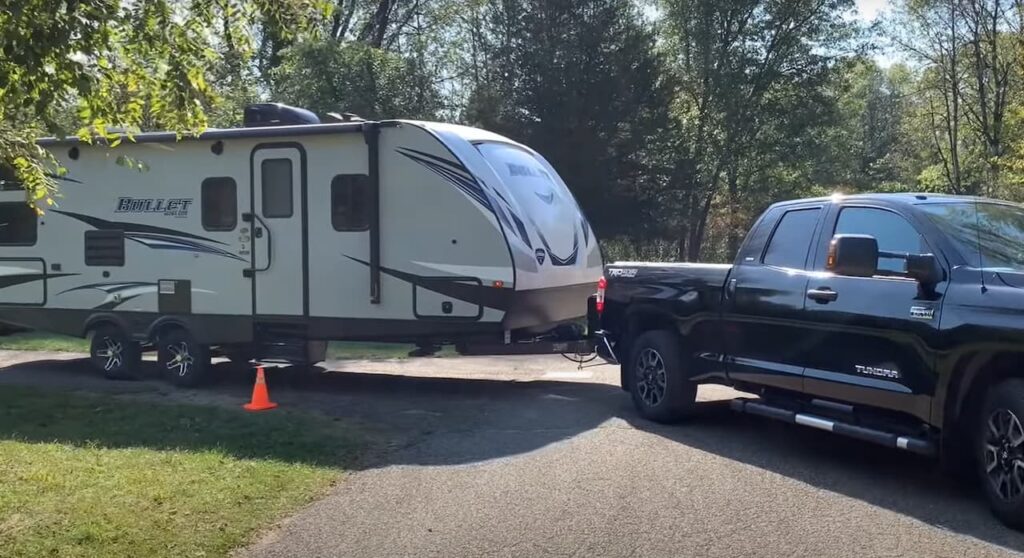
Can you run an RV air conditioner while driving?
Your RV’s generator may be used to power your RV’s rooftop air conditioner. As a result, you may operate your air conditioning while driving if your generator is operational. Just keep the capacity of your fuel tank in mind and turn off your AC before turning off your generator.
If you don’t have a generator, or if yours is not operational, then you’ll need to find other ways to keep cool while driving.
One option is to use an evaporative cooler, also known as a swamp cooler. These devices work by using evaporation to cool the air around them, and they can be very effective in dry climates.
Another option is to use window shades/screens on your RV’s windows. This will help keep the interior of your RV cooler by blocking out some of the sun’s heat.
Finally, you can always dress for the weather – wear light, loose-fitting clothing in hot weather and layers in cold weather. By taking these steps, you can help make your RV trip more comfortable for everyone involved.

